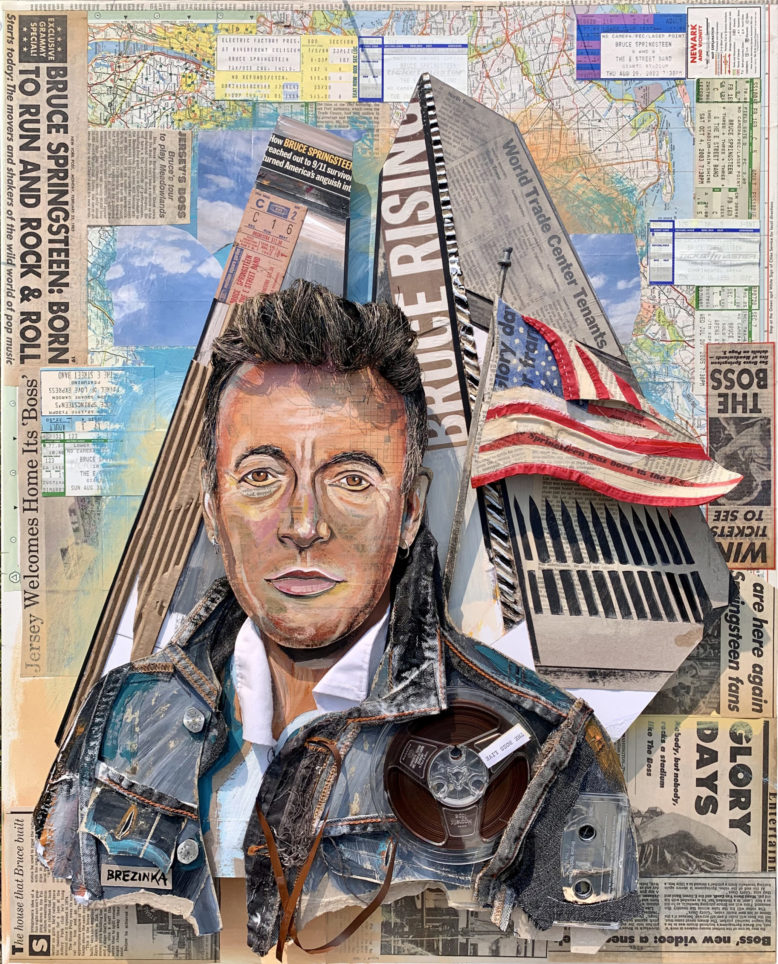
While some of its songs were written before 9/11, Springsteen’s The Rising album has always been considered a response to the tragedy. Illustration by Wayne Brezinka
I was in first grade on September 11, 2001, so I don’t recall much about a day that shaped the world I grew up in. But I’ve had help understanding the tragedy—and its aftermath—from a New Jersey rocker.
Raised as a Bruce Springsteen fan, I try to listen to The Rising every 9/11. While some songs were penned before the terrorist attacks, the album, now 20 years old, was meant to reflect on that day. My interpretation is that the record encompasses all the things we should never forget, but often do.
Songs like the title track and “Into the Fire” are tributes to first responders. Others convey the grief that many still feel, such as “Waitin’ on a Sunny Day” and “My City of Ruins,” which was originally written about Asbury Park. Those topics and people deserve their time on the album and at annual 9/11 services; there is certainly no shortage. But it’s the songs that dive below the surface and introduce other ideas that make The Rising a more complete rumination than the yearly remembrances we’re accustomed to.
The country’s desire for revenge—and the further bloodshed it caused—is immediately examined on the opening “Lonesome Day,” as well as “Empty Sky.” “Better ask questions before you shoot,” Springsteen warns on the album starter. We didn’t do that enough then, and we don’t now, glossing over past errors with ceremonies that prioritize patriotism.
Two decades later, many have confused patriotism with nationalism and xenophobia. Surely, 9/11 fueled some of that hate. It’s why “Worlds Apart,” a song about an interfaith relationship and a “troubled country,” strikes me as the album’s most poignant offering. With a blend of Qawwali vocals (a form of Sufi Islaamic devotional singing) and American rock, Springsteen begged for love and understanding between different cultures when anti-Muslim fear was on the rise. A similar plea can be inferred from “Let’s Be Friends (Skin to Skin),” but sadly, we are still struggling to achieve that.
We have also failed, in many ways, to take care of those who lost someone or something besides their own life on 9/11. Health programs and victims’ funds have not received the financing, attention or urgency they require, further burdening survivors. The Rising highlights people in such positions: “You’re Missing” conjures images of a family without a father, while “Nothing Man,” written in the 1990s, can be repurposed as a story about a first responder battling PTSD and survivor’s guilt.
Other thought-provoking tracks include “The Fuse,” which hints at self-medicating via vices during hard times. The haunting “Paradise” shifts perspectives—among a suicide bomber, a Pentagon widow, and a survivor desperate to reunite with a loved one—and challenges faith. Even the upbeat “Mary’s Place” comments on mourning and religion.
[RELATED: Artist Wayne Brezinka on His 3-D Portrait of Bruce Springsteen]
Despite all the sorrow, The Rising still conveys resilience. “Countin’ on a Miracle” uses fairy-tale fixtures to overcome loss, and “Further On (Up the Road),” another pre-9/11 creation, expresses a soldier’s hope for a brighter future. “One sunny morning we’ll rise I know,” Springsteen sings.
That line, and much of The Rising, still sounds relevant. But it also feels unfulfilled, and much of the album’s messages appear ignored in a divided country.
And so I’ll spend this 9/11 like I usually do: blasting the Boss and thinking about some of the things we’ve forgotten.
You can listen to The Rising below:
